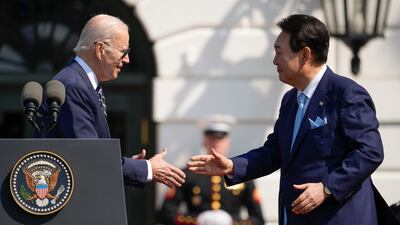The US reinforced its commitment on Wednesday to defend Seoul against any attack from Pyongyang, including by sending nuclear-armed submarines to South Korea for the first time in more than 40 years.
Called the Washington Declaration, the new extended nuclear deterrence effort was unveiled as US President Joe Biden hosted South Korean leader Yoon Suk-yeol for a state visit amid heightened anxiety over an increased pace of ballistic missile tests by North Korea.
The US leader said his administration was "doubling down" on its co-operation with South Korea as Pyongyang increases its "challenges".
“A nuclear attack by North Korea against the United States or its allies and partners is unacceptable, and will result in the end of whatever regime were to take such an action," Mr Biden said alongside Mr Yoon in the White House Rose Garden.
But he said the US was not going to be stationing nuclear weapons on the Korean Peninsula.
US nuclear submarines used to make frequent stops in South Korea during the Cold War, but since North and South agreed to denuclearise those visits stopped.
North Korea has repeatedly breached a declaration in 1992 not to develop nuclear weapons.
The White House said the "major deliverables" of Mr Biden's bilateral meeting with Mr Yoon in South Korea “will send a very clear and demonstrable signal" of Washington's "credibility" on deterrence commitments to the Republic of Korea.
This month, North Korea fired a suspected ballistic missile towards the waters off its east coast, prompting a warning in Japan for residents to take shelter.
The launch followed leader Kim Jong-un calling for “practical and offensive” war capabilities and Pyongyang cutting communication lines with Seoul, which are normally used to reduce tension on the heavily armed border.
Under the Biden administration, the US-South Korea alliance has “grown far beyond the Korean Peninsula, and is now a force for good in the Indo-Pacific and around the world”, White House National Security Adviser Jake Sullivan said on Monday.
The White House grounds and their surroundings in Washington were adorned with US and South Korean flags side-by-side, as the allies mark 70 years of an alliance that has tightened under Mr Biden.
Mr Yoon said he went to the White House to "look back" and "look ahead" on the alliance forged after the Korean War.
"Our alliance is forged in blood as a fight for freedom," he said. "It's not a transactional alliance … it's a global alliance for freedom, peace, prosperity," he said.
Mr Yoon, a conservative political newcomer compared to veteran liberal politician Mr Biden, is the first leader from the Indo-Pacific to come to the Biden White House for a state visit.
The Biden administration has continued a “pivot to Asia” in its defence priorities, centred on countering China.
The administration's defence budget proposal for fiscal year 2024 included $9.1 billion for the Pacific Deterrence Initiative, which is geared towards boosting Washington's regional competitiveness against Beijing, and $37.7 billion for modernising US nuclear capabilities.
And the historic Aukus deal with the UK and Australia is aimed at sharpening wsestern-aligned Indo-Pacific defence capabilities.
Mr Yoon has emphasised the importance of the US strategic relationship.
During his time in office, he has resumed joint military exercises with Washington to prepare for a potential North Korean attack and worked with the US to decrease global supply-chain dependence on China.
But the Washington-Seoul relationship does not come without challenges.
A recent report from the Centre for a New American Security in Washington said “the allies have divergent preferences regarding the speed, manner and degree of partial decoupling with China”.
Seoul maintains deep trade ties with Beijing, which the think tank said “will continue to make it vulnerable to Chinese political and economic coercion".
South Korean “concerns about China have grown as Beijing shields Pyongyang and acts aggressively elsewhere in the region, including toward Taiwan”, the report states.
“But South Korea’s approach to China will continue to differ from that of the United States.”
Meanwhile, a bipartisan group in Congress formally introduced legislation this week welcoming Mr Yoon to Washington and emphasising its relationship with Seoul as the “linchpin to safeguarding peace, security and prosperity on the Korean Peninsula and in the Indo-Pacific”.
“Our alliance is vital to addressing the enduring and emerging challenges we share, from global health and climate change to North Korea’s nuclear ambitions,” House foreign affairs committee ranking member Gregory Meeks said in a statement.
After their meeting and an official state dinner at the White House, Mr Yoon is due to deliver an address to a joint session of Congress on Thursday.


